国际海事公约概论
国际海事公约概论

第十二条 国际航行船舶进出中华人民 共和国港口,必须接受主管机关的检查。 本国际国内航行船舶进出港口,必须办理 进出港签证。 第十三条 外国籍船舶进出中华人民共 和国港口或者在港内航行、移泊以及靠港 外系泊点、装卸站等,必须由主管机关指 派引航员引航。
《中华人民共和国海洋环境保护法》
2000年4月1日起施行。共十章,九十八条。 第一章 第二章 第三章 第四章 第五章 第六章 第七章 第八章 第九章 第十章 总则 海洋环境监督管理 海洋生态保护 防止陆源污染物对海洋环境的污染损害 防治海岸工程建设项目对海洋环境的污染损害 防治海洋工程建设项目对海洋环境的污染损害 防治倾倒废弃物对海洋环境的污染损害 防止船舶及有关作业活动对海洋环境的污染损害 法律责任 附则
如:《中华人民共和国海上交通安全法》 第三条 中华人民共和国港务监督机构, 是对沿海水域的交通安全实施统一监督管 理的主管机关。 第四十四条 对违反本法的,主管机关 可视情节,给予下列一种或几种处罚: 一、警告; 二、扣留或吊销职务证书; 三、罚款。
简易程序 第三十三条 违法事实确凿并由法定依 据,对公民处以50元以下、对法人或其他 组织处以1000元以下罚款或者警告的行政 处罚的,可以当场作出行政处罚决定。当 事人应当依照本法第四十六条、第四十七 条、第四十八条的规定履行行政处罚决定。
《中华人民共和国行政处罚法》
1996年10月1日起实施。共八章,六十四条。 第一章 总则 第二章 行政处罚的种类和设定 第三章 行政处罚的实施机关 第四章 行政处罚的管辖和适用 第五章 行政处罚的决定 第六章 行政处罚的执行 第七章 法律责任 第八章 附则
第十七条 法律、法规授权的具有管理 公共事务职能的组织可以在法定授权范围 内实施行政处罚。
关于国际海事组织经修正的年国际海上人命安全公约修
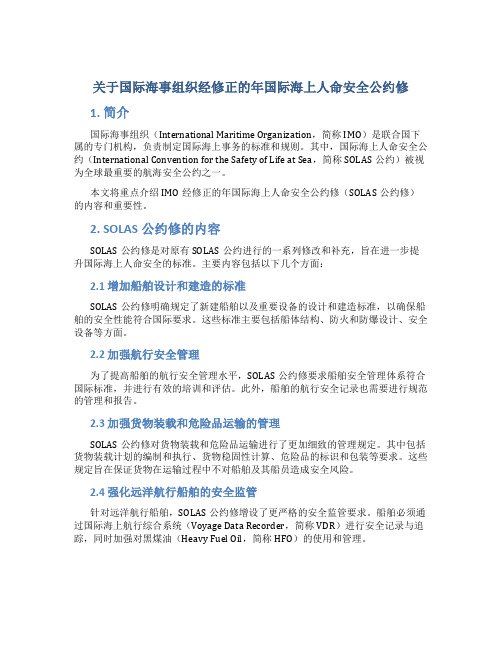
关于国际海事组织经修正的年国际海上人命安全公约修1. 简介国际海事组织(International Maritime Organization,简称IMO)是联合国下属的专门机构,负责制定国际海上事务的标准和规则。
其中,国际海上人命安全公约(International Convention for the Safety of Life at Sea,简称SOLAS公约)被视为全球最重要的航海安全公约之一。
本文将重点介绍IMO经修正的年国际海上人命安全公约修(SOLAS公约修)的内容和重要性。
2. SOLAS公约修的内容SOLAS公约修是对原有SOLAS公约进行的一系列修改和补充,旨在进一步提升国际海上人命安全的标准。
主要内容包括以下几个方面:2.1 增加船舶设计和建造的标准SOLAS公约修明确规定了新建船舶以及重要设备的设计和建造标准,以确保船舶的安全性能符合国际要求。
这些标准主要包括船体结构、防火和防爆设计、安全设备等方面。
2.2 加强航行安全管理为了提高船舶的航行安全管理水平,SOLAS公约修要求船舶安全管理体系符合国际标准,并进行有效的培训和评估。
此外,船舶的航行安全记录也需要进行规范的管理和报告。
2.3 加强货物装载和危险品运输的管理SOLAS公约修对货物装载和危险品运输进行了更加细致的管理规定。
其中包括货物装载计划的编制和执行、货物稳固性计算、危险品的标识和包装等要求。
这些规定旨在保证货物在运输过程中不对船舶及其船员造成安全风险。
2.4 强化远洋航行船舶的安全监管针对远洋航行船舶,SOLAS公约修增设了更严格的安全监管要求。
船舶必须通过国际海上航行综合系统(Voyage Data Recorder,简称VDR)进行安全记录与追踪,同时加强对黑煤油(Heavy Fuel Oil,简称HFO)的使用和管理。
3. SOLAS公约修的重要性SOLAS公约修的修订是为了应对海上人命安全面临的新挑战和风险,使公约更加符合现实需求。
SOLAS-公约精解
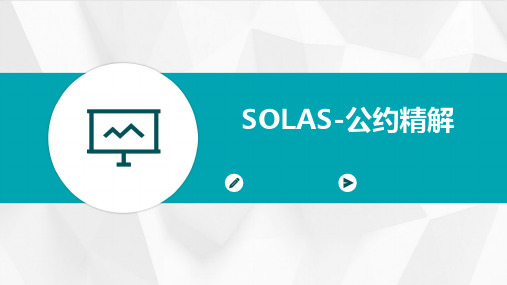
SOLAS公约还规定了船上机器和设备的安全性要 求,包括设备的位置、固定、防护和标识等。
消防要求
01
02
03
消防设备和器材
SOLAS公约规定了船上必 须配备的消防设备和器材, 包括灭火器、消防栓、消 防泵、灭火水带等。
消防设施维护
SOLAS公约要求船上消防 设施必须定期进行维护和 检查,确保其处于良好状 态。
《SOLAS公约》进行重大 修订,引入了新的安全标 准和要求。
02
SOLAS公约主要内容
结构要求
01 船体结构
SOLAS公约规定了船体结构必须满足的强度要求, 包括船壳板、船底板、甲板和舷侧结构等。
02 货舱和压载舱
SOLAS公约对货舱和压载舱的结构也做出了规定, 要求满足一定的耐火、防水和防腐蚀等性能。
THANKS
感谢观看
港口国监督
港口国应实施对到港船舶的安全检查,核实船舶是否符合SOLAS公约的要求,并采取措 施纠正不符合规定的船舶。
国内实施情况
法律法规制定
各国政府根据SOLAS公约的要求, 制定相应的国内法律法规,明确 船舶、船员和港口设施的安全要
求。
监管机构设置
各国政府设立专门的监管机构, 负责监督和执行国内法律法规,
确保船舶和港口设施的安全。
培训与教育
各国政府提供相关的培训和教育 资源,提高船员和港口工作人员
的安全意识和操作技能。
实施中遇到的问题与挑战
技术和资源限制
一些发展中国家可能面临技术和资源 的限制,难以全面实施SOLAS公约的
所有要求。
港口国监督力度不一
不同国家的港口国监督力度可能存在 差异,导致一些船舶在某些港口可能
国际海事公约
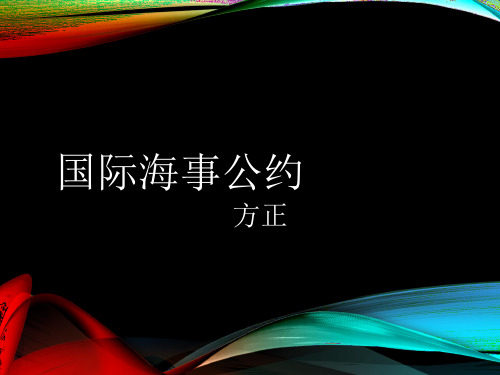
• 国际劳工局是国际劳工组织的常设秘书处和所有活动的联络处, 它受理事会的监督并接受局长的领导,局长的任期每届为5年, 可以连选连任。
国际劳工标准
• 国际劳工标准采用公约和建议书的形式发布。国际劳工公约是 国际性条约,须经国际劳工组织成员国批准方对成员国生效, 而建议书则无法律约束力。
• 国际劳工组织自成立以来,先后通过了近40部规范海上劳工 权益保护方面的公约,其中8个公约对于保障工作中的基本人 权至关重要,国际劳工组织要求各成员国需全部予以批准并充 分、有效实施。
• 政府间海事协商组织 • 《政府间海事协商组织公约》 • 国际海事组织的宗旨是:“在与从事国际贸易的各种航运技术 事宜有关的政府规定和惯例方面,为各国政府提供合作机制; 并在与海上安全、航行效率和防止及控制船舶对海洋造成污染 有关的问题上,鼓励和便利各国普遍采用最高可行的标准” • 国际海事组织是经济和社会理事会下属的专业技术机构
国际劳工标准
• 建议书处理的议题通常与公约是一致的,它制定指导方针,以 指导各国的政策制定和行动。截至2002年7月,国际劳工组织 共通过了193个建议书,内容涉及范围广泛。无论是公约还是 建议书都旨在给世界各国的工作条件和实践带来切实的影响。
综合海事劳工公约
• 国际劳工组织从2001年开始着手《综合海事劳工公约(草案)》 的制定工作,公约整合了国际劳工组织自成立85年以来制定 的60多个现有海事劳工公约和建议书,清除了现行劳工标准 中存在的大部分矛盾的和过时的条款。 • 新公约草案由3个层次构成,第一层为公约的正文条款 (Articles),包括公约的一般原则、定义、适用范围、生效和 修正等程序性条款;第二层为规则(Regulations),为公约的 实质性内容和原则要求;第三层为守则,分为两部分,A部分 为强制性标准(Standards),包括了较为具体的技术性规定; B部分为实施A部分各项标准的建议性导则(Guidelines)。
3.第二章国际海事公约4-5
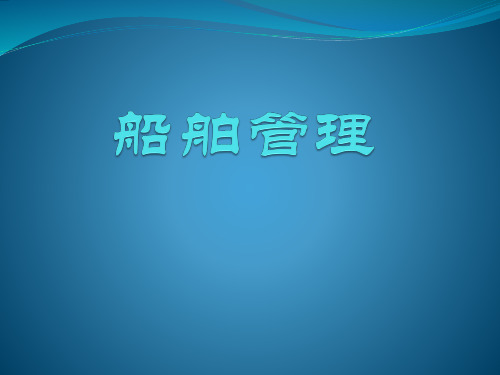
第五 国际防止船舶造成污染公约
二、公约框架和主要内容
该公约共有20 条,另附有2 个议定书和6 个附则。 议定书Ⅰ 是关于涉及有害物质事故报告的规定,共5
条,该议定书经1985 年修正后于1987 年4 月6 日生效。 议定书Ⅱ 是关于争端的仲裁,共10 条,规定了缔约国
107.以下关于MARPOL公约陈述正确的是; A MARPOL公约的六个附则目前全部生效 B MARPOL公约的附则IV目前尚未生效 C 我国尚未加入MARPOL公约附则IV D MARPOL公约附则VI目前在我国尚未生效 解析:A P22
考试大纲要求:
3.4 海员培训、发证和值班标准国际公约 3.4.1 功用、构架与适用范围 3.4.2 功能发证 3.4.5 监督程序
附则Ⅳ 防止船舶生活污水污染规则(任选附则),2003 年 9 月27 日生效;
附则Ⅴ 防止船舶垃圾污染规则(任选附则),1988 年 12 月31 日生效;
附则Ⅵ 防止船舶造成空气污染规则(任选附则),1997 年 9 月26 日制定,2005 年5月19日生效。
第五 国际防止船舶造成污染公约
3 )船长15m 及以上的船舶发生: (1)影响船舶安全的损 失、失灵或故障,包括(但不限于)碰撞、搁浅、着火、爆 炸、结构失效。浸水和货物移动;或 (2)导致影响航行安 全的损坏、失灵或故障,包括(但不限于)操舵装臵、推进 装臵、发电系统和主要的船上导航设备失灵或故障;或 4 ) 船舶营运期间排放油类或有毒液体物质超过现行公约允许的 排放量或瞬间排放速率。
第四节 海员培训、发证和值班标准国际公约 二、公约框架与主要内容
第四节 海员培训、发证和值班标准国际公约
1.正文内容
STCW正文共有17条,阐述和规定了制订公约的宗旨、 缔约国义务、公约所用名词解释、适用范围、资料交 流、与其他条约关系、证书、特免证明、过渡办法、 等效办法、监督、技术合作、修正程序、加入公约形 式、生效条件,退出方式、保管以及文本文字。
国际海事组织公约概览
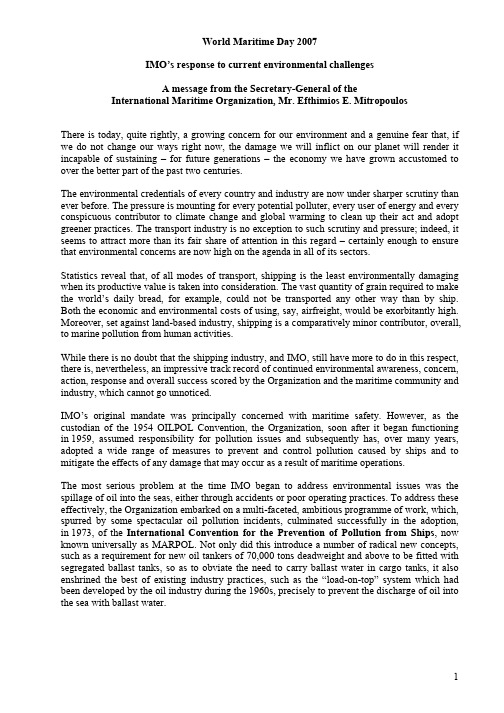
World Maritime Day 2007IMO’s response to current environmental challengesA message from the Secretary-General of theInternational Maritime Organization, Mr. Efthimios E. MitropoulosThere is today, quite rightly, a growing concern for our environment and a genuine fear that, if we do not change our ways right now, the damage we will inflict on our planet will render it incapable of sustaining – for future generations – the economy we have grown accustomed to over the better part of the past two centuries.The environmental credentials of every country and industry are now under sharper scrutiny than ever before. The pressure is mounting for every potential polluter, every user of energy and every conspicuous contributor to climate change and global warming to clean up their act and adopt greener practices. The transport industry is no exception to such scrutiny and pressure; indeed, it seems to attract more than its fair share of attention in this regard – certainly enough to ensure that environmental concerns are now high on the agenda in all of its sectors.Statistics reveal that, of all modes of transport, shipping is the least environmentally damaging when its productive value is taken into consideration. The vast quantity of grain required to make the world’s daily bread, for example, could not be transported any other way than by ship. Both the economic and environmental costs of using, say, airfreight, would be exorbitantly high. Moreover, set against land-based industry, shipping is a comparatively minor contributor, overall, to marine pollution from human activities.While there is no doubt that the shipping industry, and IMO, still have more to do in this respect, there is, nevertheless, an impressive track record of continued environmental awareness, concern, action, response and overall success scored by the Organization and the maritime community and industry, which cannot go unnoticed.IMO’s original mandate was principally concerned with maritime safety. However, as the custodian of the 1954 OILPOL Convention, the Organization, soon after it began functioning in 1959, assumed responsibility for pollution issues and subsequently has, over many years, adopted a wide range of measures to prevent and control pollution caused by ships and to mitigate the effects of any damage that may occur as a result of maritime operations.The most serious problem at the time IMO began to address environmental issues was the spillage of oil into the seas, either through accidents or poor operating practices. To address these effectively, the Organization embarked on a multi-faceted, ambitious programme of work, which, spurred by some spectacular oil pollution incidents, culminated successfully in the adoption, in 1973, of the International Convention for the Prevention of Pollution from Ships, now known universally as MARPOL. Not only did this introduce a number of radical new concepts, such as a requirement for new oil tankers of 70,000 tons deadweight and above to be fitted with segregated ballast tanks, so as to obviate the need to carry ballast water in cargo tanks, it also enshrined the best of existing industry practices, such as the “load-on-top” system which had been developed by the oil industry during the 1960s, precisely to prevent the discharge of oil into the sea with ballast water.More than 30 years later, albeit much expanded, amended and updated, the MARPOL Convention remains the most important international convention covering the prevention of pollution by ships, whether from operational or accidental causes. Today, MARPOL has six separate annexes, which set out regulations dealing with pollution from ships by oil; by noxious liquid substances carried in bulk; harmful substances carried by sea in packaged form; sewage, garbage; and the prevention of air pollution from ships. There can be no doubt that, in conjunction with a variety of other measures, MARPOL has laid the foundation for substantial and continued reductions in pollution from ships and, this, despite a massive increase in world seaborne trade.According to shipping market analysts, world seaborne trade increased by around 135 per cent between 1985 and 2006. Oil and petroleum products accounted for a significant part of this increase, rising by a similar percentage. In sharp contrast, estimates of the quantity of oil spilled during the same period show a steady reduction by some 85 per cent. Figures reveal that, despite the rare major accident, which can cause a spike in the annual statistics, the overall trend demonstrates a continuing improvement, both in the number of oil spills and quantity of oil spilled each year.In the current decade, the average number of oil spills over 700 tonnes has shrunk from over 25 in the 1970s to just 3.7. It is interesting to note, in this context, that the biggest single “decade-to-decade” reduction was from the 1970s to the 1980s, coinciding with the adoption and entry into force of the MARPOL Convention, which is rightly credited with having had a substantial positive impact in decreasing the amount of oil that enters the sea from maritime transportation activities. One major oil company has estimated that the tankers it owns, or uses under long-term lease, spill less than one teaspoon of oil for every million gallons transported; while tanker owners take pride in statistics that show that 99.9996 per cent of all oil transported by sea is delivered safely and without impact on the marine environment.While always advocating a global approach, MARPOL, nevertheless, recognizes that some areas need protection over and above that sought under normal circumstances. To this end, it defines certain sea areas as “Special Areas”, in which the adoption of special mandatory measures for the prevention of sea pollution is required, so that such areas are provided with a level of protection higher than elsewhere. Moreover, IMO has adopted criteria for the identification and designation of “Particularly Sensitive Sea Areas”, which are deemed to require an even higher degree of protection because of their particular significance for ecological or socio-economic or scientific reasons, and because they may be vulnerable to damage by international maritime activities.IMO’s environmental work in recent years has covered a remarkably broad canvas, embracing everything, from the quality of our atmosphere to the microscopic aquatic life-forms that can be transported around the world in ships’ ballast water and deposited in alien local ecosystems where, by disrupting their delicate balance, they can cause immense damage.IMO’s work on this latter topic led to the adoption, in February 2004, of the Ballast Water Management Convention, and is still continuing today. Another significant milestone for the protection of the marine environment was reached in March 2006, with the entry into force of the 1996 Protocol to the 1972 Convention on the Prevention of Marine Pollution by Dumping of Wastes and Other Matter, which represents a major change of approach to the question of how to regulate the use of the sea as a depository for waste materials in that, in essence, dumping is now prohibited, except for materials on an approved list.Other IMO Conventions deal with issues such as the use of harmful anti-fouling paint on ships’ hulls; preparedness, response and co-operation in tackling pollution from oil and from hazardous and noxious substances; and the right of States to intervene on the high seas to prevent, mitigate or eliminate danger to their coastlines or related interests from pollution following a maritime casualty.The issue of ship recycling has also become a growing concern, not only from the environmental point of view but also with regard to the occupational health and safety of workers in the industry. IMO is currently developing a new mandatory instrument providing legally binding and globally applicable ship-recycling regulations for international shipping and recycling facilities, which is due for adoption in the 2008-2009 biennium. And, in May of this year, IMO adopted a new Convention on the removal of wrecks that may present either a hazard to navigation or a threat to the marine and coastal environments, or both.Although IMO’s traditional role is dealing with shipping and shipping-related accidents, we have, from time-to-time, also become involved in the aftermath of marine pollution incidents emanating from sources outside shipping operations. There is sound basis in international law for our participation in the response to such incidents, through such treaties as the UN Convention on the Law of the Sea and the International Convention on Oil Pollution Preparedness, Response and Co-operation. Last year, for example, we helped to draw up and implement an action plan to assist the authorities in Lebanon with the clean-up of coastal oil pollution following an air-strike on a refinery. The plan was agreed at an international meeting convened by IMO and the United Nations Environment Programme (UNEP) in Piraeus, Greece, and its execution was supervised by the IMO-administered Regional Marine Pollution Emergency Response Centre for the Mediterranean Sea (REMPEC) and the Minister of the Environment of Lebanon.But perhaps the most significant threat to our environment today concerns atmospheric pollution. And, once again, although the shipping industry is but a small contributor to the total volume of gas emissions – compared to road vehicles, aviation and public utilities, such as power stations – atmospheric pollution from ships has, nevertheless, been significantly reduced in the last decade and IMO continues to work towards further reductions as the evidence mounts and the world becomes more aware and more concerned about the further damage that might be caused if, from our various perspectives as Governments, industry and individuals, we do not address the challenges posed by air pollution, global warming and climate change.A good deal has already been done by the shipping sector. Annex VI of MARPOL, for example, set, for the first time, limits on sulphur oxide (SOx) and nitrogen oxide (NOx) emissions from ship exhausts; prohibited deliberate emissions of ozone-depleting substances; and put a global cap on the sulphur content of fuel oil. It also contains provisions allowing for special SOx Emission Control Areas to be established (such as, for example, those agreed for the Baltic and North Sea areas), with more stringent controls on sulphur emissions. However, although the Annex entered into force in 2005, it had actually been adopted as long ago as 1997. As a result, a comprehensive review of its provisions, taking into account experience gained thus far in its implementation, as well as improvements in engine and fuel technology, is currently underway at IMO.Whether we like it or not, there is no avoiding the fact that the modern world is utterly dependent on motorized transport systems that run largely on fossil fuels. Moreover, it is also a fact of life that the use of fossil fuels carries an environmental burden. An engine burning fossil fuel will emit a quantity of so-called greenhouse gases (GHGs), principally CO2, and these emissions are now widely accepted as being significant contributory factors towards global warming and climate change.Although no mandatory instrument has yet been adopted by IMO to cover the emission of GHGs from ships, the Organization has given ample consideration to the matter, leading to the adoption, in December 2003, of an Assembly resolution on the reduction of such emissions from ships.The most comprehensive assessment to date of the contribution made by international shipping to climate change is contained in the IMO Study on GHG Emissions from Ships published in June 2000. This study identified a number of areas in which there was considerable potential for the further reduction of CO2 emissions from ships, such as optimization of hull shape, hull maintenance, propeller design and maintenance, fuel choices, machinery monitoring, ship-routeing considerations, and optimizing vessel trim, engine performance, propeller pitch and rudder angles. The study cautioned, however, that if none of the measures are applied, the projected annual growth in the world fleet size could lead to an increase in fuel consumption of some 72 per cent between the years 2000 and 2020.This study is now being updated, and a work plan with a timetable has been adopted for IMO’s future work on the reduction of GHGs from ships, in which the Organization intends to maintain its leading position, co-operating closely with international shipping and with other relevant UN bodies, to avoid unilateral action either on a global, regional or national level.* * *IMO has, over the years, adopted a wide range of measures to prevent and control pollution caused by ships and to mitigate the effects of any damage that may occur. These are all positive proof of the firm determination of Governments and the industry to reduce, to the barest minimum, the impact that shipping may have on our fragile environment. There remain, however, serious concerns at the slow pace of ratification of IMO’s environmental conventions. It took almost eight years, for example, for MARPOL’s Annex VI to reach its entry into force criteria – by which time, as mentioned earlier, it needed to undergo a substantial review; and neither the 2004 Ballast Water Management Convention nor the 2001 International Convention on the Control of Harmful Anti-fouling Systems on Ships are yet in force.My concerns in this area are threefold: first, that by not bringing IMO instruments into force at a reasonable time after their adoption, their implementation is delayed, thereby depriving the environment of their beneficial effects; second, that any further delay in tackling the issues regulated by such instruments may spur unilateral or regional measures by individual countries or groups of countries, with all the attendant negative repercussions such actions entail; and, third, that any prolongation of the situation may lead to ambiguities, which, in the final analysis, may count against seafarers, the maritime industry and the environment.The urgent need to ratify, as soon as possible, not only IMO’s environmental but, indeed, all outstanding Conventions adopted under its auspices, should be promptly recognized by all the parties concerned. After all, it was thanks to the strenuous and concerted efforts of the same Governments, working together under the aegis of the Organization, over long periods of time, that these Conventions were developed and adopted in the first place.But, even more than this, I do not wish to see the maritime community stand accused of failing in its duty towards the protection and preservation of this beautiful planet, which, it seems to me, we have neglected for too long.IMO’s work in this respect must be part of a broad-based effort in which everyone has a responsibility and everyone has a role to play, a concept precisely reflected in the well-known environmental call to action “think globally – act locally”. And, in the long term, society will need to address its own priorities and understand that nothing comes for nothing and that there will be prices and sacrifices that we must be prepared to pay and make, for the greater good of all.The decision of the IMO Council to select environmental issues to take centre stage this year, as the theme for World Maritime Day, was timely and appropriate. The theme will play centrepiece in a host of activities and initiatives, which will form part of a concerted action plan that we have been undertaking to educate people; increase their awareness about the true, and deteriorating, state of the planet; and help us all to become responsible citizens, in its fullest sense. It is only very recently that mankind has begun to understand that the planet that sustains us and gives us life is a fragile entity and that our actions can, and do, have massive repercussions. That the earth and its resources do not belong to us and are not ours to squander without thought for the future is not proving an easy lesson for us to learn, but we are gradually succeeding – or, at least, waking up to the enormity of the task that confronts us.___________。
国际海事组织公约

国际海事组织公约文章属性•【缔约国】国际海事组织•【条约领域】海事•【公布日期】1948.03.06•【条约类别】公约•【签订地点】日内瓦正文国际海事组织公约(1948年3月6日订于日内瓦)第一章本组织宗旨第一条本组织的宗旨为:一、在与从事国际贸易的航运的各种技术问题有关的政府规章和惯例方面,为各国政府提供合作机构;并在与海上安全、航行效率和防止及控制船只对海上污染有关的问题上,鼓励各国普遍采用最高可行的标准;并处理与本条所规定宗旨有关的行政与法律问题。
二、鼓励各国政府取消其对从事国际贸易的航运的歧视行为和不必要的限制,以便在没有歧视的基础上增进航运事业对世界贸易的效用;一国政府为发展本国航运事业并为安全目的而给予航运业的帮助和鼓励,如非基于旨在限制其他国家航运业自由参加国际贸易的措施,并不构成歧视行为;三、将有关航运业所采取的不正当的限制措施问题,根据第二章规定提交本组织研究;四、将联合国的任何机构或专门机构可能委托的有关航运和航运对海洋环境影响的任何问题,提交本组织研究;五、为各国政府交流有关本组织所研究的问题的情报。
第二章职权第二条为达到第一章所列各种目的,现将本组织的职权规定如下:一、对于会员、联合的任何机构或专门机构,或其他政府间的组织向本组织提出的第一条第一、二、三各款内的问题,或第一条第四款内的问题,除适用第三条的规定外,本组织加以研究,并提出意见;二、负责公约、协议或其他文件的起草工作,并向各国政府和政府间的组织推荐这些公约、协议或文件;必要时,并召集会议进行讨论;三、为会员之间进行协商,并为各国政府交流情报提供机构;四、履行与本条第一、二及三款有关的职权,尤其应履行有关海事问题的国际文件所赋予的职权;五、根据需要并按第十章规定,促进本组织宗旨范围内的合作。
第三条对于本组织认为可能通过国际航运业的正常手续处理的问题,本组织将建议按照正常手续处理。
当本组织认为与某些航运业所采取不正当的限制措施有关的任何问题,不可能或者事实已经证明不可能通过国际航运业的正常手续处理,经其中一个会员提出要求,本组织应对此问题加以研究,但须先由有关会员进行直接谈判。
了解国际海事组织及相关国际公约的概况

了解国际海事组织及相关国际公约的概况4.1国际海事组织机构的组成国际海事组织由大会、理事会和4个主要委员会组成,即海上安全委员会、海上环境保护委员会、法律委员会和技术合作委员会,此外还有一个便利委员会和主要技术委员会的一些分委会。
4.2 国际海事组织各委员会的职责4.2.1 大会(The Assembly)的职责大会(The Assembly)是该组织的最高决策机构,它由所有成员国组成,每两年举行一次会议,但在必要时可以召开特别会议。
大会负责批准工作计划,审议财务预算和决定该组织的财务安排,大会还选举理事会。
4.2.2 理事会(The Council)的职责理事会(The Council)由大会选举的32个成员国组成,每两年改选一次,于每届大会结束后开始工作。
《国际海事组织公约》规定大会选举理事会成员应遵守下列标准:(a)10个为在提供国际航运服务方面有最大利害关系的国家;(b)10个为在国际海上贸易方面有最大利害关系的国家;(c)20个不是根据上述(a)或(b)选出的,在海上运输或航行方面有特殊利害关系的国家,选它们进入理事会将保证世界所有主要地理地区有代表参加。
理事会是国际海事组织的执行机构,在大会的领导下负责管理该组织的工作。
在两届大会之间,理事会履行大会的所有职能,只有按照公约第15(j)条向各国政府提出有关海上安全和防止污染建议的职能仍由大会行使。
理事会的其他职能有:(1)协调该组织内各机构的活动;(2)审议该组织的工作计划草案和财务预算,并提交大会;(3)受理委员会和其他机构提交的报告和建议,提出意见和建议后一并提交大会和各成员国;(4)任命秘书长并报大会批准;(5)就国际海事组织与其他组织的关系达成协议或作出安排,报大会批准。
4.2.3 海上安全委员会(MSC)的职责海上安全委员会(MSC)是该组织的最高技术机构。
它由国际海事组织所有成员国组成。
海上安全委员会的职能是“在国际海事组织的职权范围内研究有关助航设备、船舶的构造和设备、安全配员、避碰规则、危险货物操作、海上安全程序和要求、航道信息、航海日志和航行记录、海难事故调查、救捞和救助及其他直接影响海上安全的事宜。
国际海事组织的国际条约保护海洋生态系统的可持续航运

国际海事组织的国际条约保护海洋生态系统的可持续航运在当今全球化的背景下,航运业的发展越来越迅速。
然而,航运业的繁荣也对海洋生态系统造成了巨大的压力和威胁。
为了保护海洋环境和促进可持续航运,国际海事组织(IMO)制定了一系列国际条约。
这些条约的主要目标是在保障航运安全的同时降低其对海洋生态系统的影响,从而实现可持续航运。
一、国际公约与国际海洋生态系统国际公约是在全球范围内制定的具有约束力的法律文件,旨在协调不同国家之间的行动,并在特定领域内加强合作。
国际海事组织制定的国际公约是为了保护海洋生态系统和航运安全的双重目标。
二、国际海事组织的保护海洋生态系统相关条约国际海事组织通过一系列条约确保船舶的设计、建造、操作和处置符合环境保护的标准。
其中最重要的条约包括以下几个方面:1. 国际海上油污染防治公约(MARPOL)MARPOL公约旨在防止和控制船舶油污染。
它规定了船舶排放的油污染物的限制,并规定了清洁船舶设备的使用。
通过国际合作,MARPOL公约有效地减少了船舶对海洋环境的污染。
2. 国际船舶废物管理公约(MARPOL)MARPOL公约还规定了船舶废物的处理和处置方式。
根据公约,船舶废物必须按照规定的程序处理,包括垃圾、化学品和危险物质的处理。
这有助于防止船舶废物对海洋生态系统造成污染。
3. 国际航行规则国际航行规则是为保护船舶安全和防止碰撞而制定的。
这些规则确定了船舶在海上的行驶方式,规定了船舶的导航、通信和航行行为。
通过遵守这些规则,船舶可以减少对海洋生态系统的冲击。
4. 国际海上物质运输(IMSBC)规则IMSBC规则是为规范散装货物在船上的运输而制定的。
这些规则确保船舶在运输过程中妥善处理散装货物,并防止货物泄漏对环境造成损害。
三、国际条约的实施与监督国际海事组织为确保国际条约的有效实施和监督,设立了一系列机构和程序。
其中包括了对船舶的检查和审查机制,以确保船舶符合国际公约的要求。
国际海事组织还组织培训和宣传活动,提高船舶各方对国际公约的认识和遵守程度。
2.第二章 国际海事公约1-3
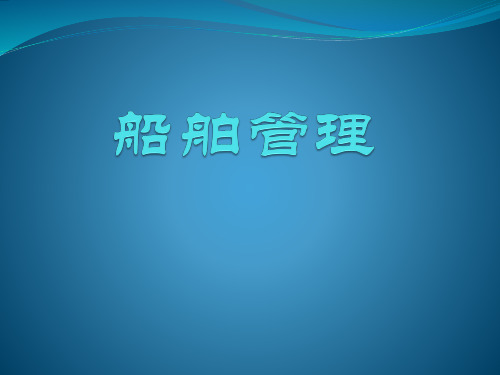
第二节 国际海上人命安全公约
3.1988年议定书 主要内容引入了“全球海上遇险与安全系统(GMDSS)”
和“检验与发证协调系统(HSSC)” 生效后在1988年议定书缔约国之间废止1978年议定书。
第二节 国际海上人命安全公约
4.附则主要内容——(考试主要内
容)
适用范围:除另有规定外,附则仅适用于从事国际航行的 船舶,但不适用于500总吨以下的货船、军用舰艇和运兵 船、非机动船、制造简陋的木船、非营业性的游艇和渔船。
海员培训、发证和值班标准国际公约International Convention on Standards of Training,Certification and Watchkeeping for Seafarers(STCW)
国际防止船舶造成污染公约MARPOL73/78 压载水公约及其他防污公约与规则
连接公海或经济专属区
第一节 联合国海洋法公约
四、公约对各有关方在海上安全和环境保护
方面的要求
1.船籍国义务
安全方面 环保防污方面
ቤተ መጻሕፍቲ ባይዱ
2.沿岸国义务 3.港口国义务
第二节 国际海上人命安全公约
SOLAS1974
公约宗旨:保障海上人命安全
一、背景和发展概况
1912年4月14日,英国制造长296米,号称“永不沉没” 的豪华邮轮“泰坦尼克”(TITANIC)号首航便沉没于 冰冷的北大西洋海底。造成1500多人丧生。为了吸取 “泰坦尼克号”的教训,1913年底,第一次国际海上 人命安全会议在英国召开,并于1914年1月签订了第一 个SOLAS公约。
第二节 国际海上人命安全公约
1.公约条款
由船籍国负责确保悬挂其国旗的船舶达到这一要求
SOLAS公约精解
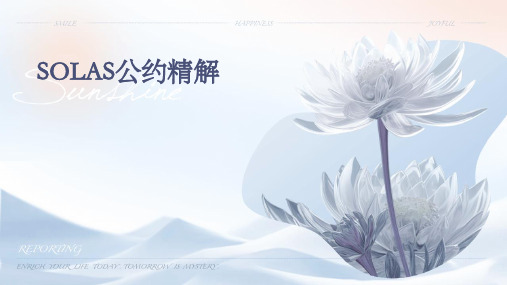
培训和教育
加强对船员和相关人员的培训和 教育,使他们能够熟练掌握和应 用新技术,提高海上安全保障水
平。
公约在全球范围内的推广与实施挑战
01
02
03
各国差异
由于各国在政治、经济、 文化等方面存在差异, SOLAS公约在全球范围内 的推广和实施面临挑战。
监管力度
各国对SOLAS公约的监管 力度不同,导致公约的实 施效果存在差异。
公约范围
SOLAS公约适用于国际航运中的客船、 货船、油船和其他类型船舶,包括浮 动平台、浮动式装置和船舶救生设备 等。
公约还规定了船舶在遭遇海难时的应 急措施和救助要求,以确保人命安全 和财产安全。
公约规定了船舶的结构、设备和运营 等方面的要求,涵盖了船舶设计、建 造、装备、检验、维护等方面的规定。
促进国际航运的规范化
SOLAS公约规定了船舶建造、设备、安全等方面的要求, 为国际航运提供了统一的标准和规范,有助于提高船舶安 全水平和航运效率。
增强国际航运的竞争力
SOLAS公约的实施使得各国船舶在安全和环保方面的标准 逐渐统一,降低了船舶营运成本,提高了国际航运的竞争 力。
推动国际航运技术创新
SOLAS公约对船舶安全和环保方面的要求不断提高,促使 船舶制造商和航运公司不断研发新技术、新设备,推动国 际航运技术创新和发展。
处罚和制裁机制
对于违反SOLAS公约规定的航运公司和船舶,各国政府有权采取相应 的处罚和制裁措施,包括罚款、扣留船舶等。
03
修正案和改进机制
SOLAS公约是一个不断发展和完善的国际公约,国际海事组织会根据
实际情况和需要制定修正案和改进措施,以进一步提高海上安全水平。
04
SOLAS公约的影响与意义
国际海上人命安全公约名词解释-概述说明以及解释
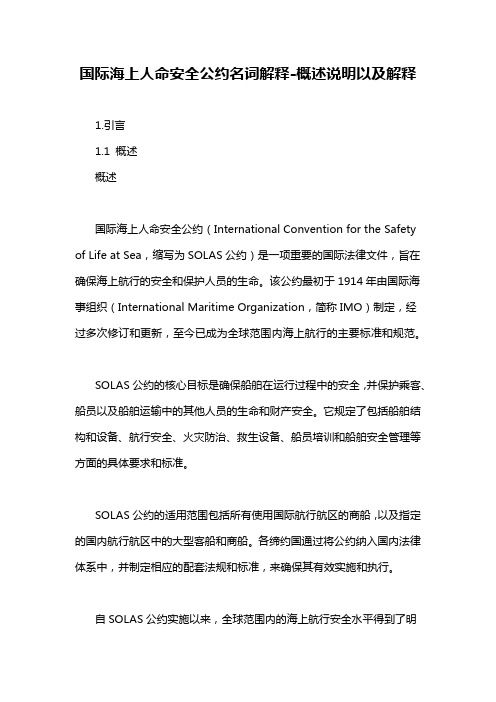
国际海上人命安全公约名词解释-概述说明以及解释1.引言1.1 概述概述国际海上人命安全公约(International Convention for the Safety of Life at Sea,缩写为SOLAS公约)是一项重要的国际法律文件,旨在确保海上航行的安全和保护人员的生命。
该公约最初于1914年由国际海事组织(International Maritime Organization,简称IMO)制定,经过多次修订和更新,至今已成为全球范围内海上航行的主要标准和规范。
SOLAS公约的核心目标是确保船舶在运行过程中的安全,并保护乘客、船员以及船舶运输中的其他人员的生命和财产安全。
它规定了包括船舶结构和设备、航行安全、火灾防治、救生设备、船员培训和船舶安全管理等方面的具体要求和标准。
SOLAS公约的适用范围包括所有使用国际航行航区的商船,以及指定的国内航行航区中的大型客船和商船。
各缔约国通过将公约纳入国内法律体系中,并制定相应的配套法规和标准,来确保其有效实施和执行。
自SOLAS公约实施以来,全球范围内的海上航行安全水平得到了明显提升。
船舶结构和设备的安全性得到了极大改善,航行安全技术和交通管理手段不断创新和完善,船员的培训水平和应急响应能力也得到了显著提高。
然而,随着海上贸易的不断发展和船舶规模的增大,海上人命安全面临着新的挑战和威胁,因此,不断更新和完善SOLAS公约是必要的。
本文将对SOLAS公约中涉及的关键名词进行解释和阐述,以帮助读者更好理解公约的内容和要求。
通过对这些名词的解释和理解,读者将能够更深入地了解和把握海上人命安全的重要性,以及公约对海上航运行业的积极影响。
1.2 文章结构文章结构部分的内容可以包括以下信息:文章结构部分是对整篇文章的描写和组织方式进行介绍,以引导读者更好地理解和阅读文章的内容。
在这一部分,将详细说明文章的各个章节和内容安排,以及它们之间的逻辑关系。
第三章 国际海事公约
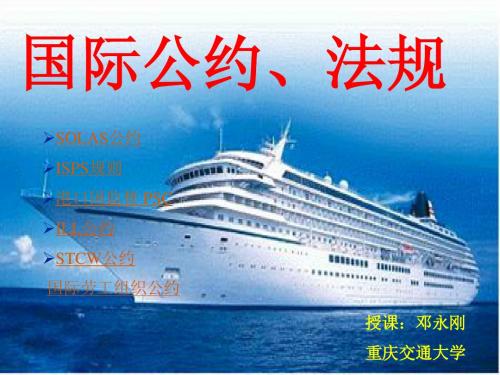
公约附则主要内容
1. 第I章 总则 后来增加: 第IX章 船舶安全营运
2. 第Ⅱ章 构造
3. 第Ⅲ章 救生设备与装置 4. 第Ⅳ章 无线电通信设备 5. 第V章 航行安全 6. 第Ⅵ章 货物装运 7. 第Ⅶ章 危险货物的装运 8. 第Ⅷ章 核能船舶
第X章 高速船安全措施
第XI章 加强海上安全、 保安的特别措施 第XII章 散货船安全附加 措施 鉴于公约内容的迅速扩充,多采 用单项规则置于附则之外。 FSS,LSA,IMDG,ISM,ISPS等
第Ⅱ章构造 (结构、分舱与稳性、机电设备)
2.2驾驶台与机器处所的通讯 从驾驶台到机器处所或集控室至少设置两套独立的控制系统,
其中一套应为在机器处所和驾驶台均能直接显示指令或回令的车种。 在其他任何可以控制推进器速度和方向的位置处,也应配备适当的
通讯系统,以便接受驾驶台和机舱的指令。
第Ⅱ章构造 (结构、分舱与稳性、机电设备)
第Ⅱ章构造 (结构、分舱与稳性、机电设备)
2.4 破损控制 (1)驾驶室内应有固定显示的或可随时使用的破损控制图,指导高 级船员,图上应清晰显示每层甲板及货仓的水密舱室界限面,上面 的开口及其关闭装置和任何控制装置,以及扶正由于进水产生的横 倾的装置,此外,还应给船上高级船员提供包含上述资料的小册子。 (2)应收入资料的一般预防措施应包括主管机关认为在船舶正常营 运时为保持水密完整性所需的设备、条件和操作程序清单;特殊预 防措施应包括主管机关认为对船舶、旅客和船员的生存至关重要的 各种事项。
船舶检验简介
一、检验的目的
船舶检验的目的在于通过对船舶及其设备的检验,促使船舶公司
保持船舶的良好技术状况,以保证船舶的营运安全和防止污染、损 害海洋环境;保证船旗国和港口国政府对船舶实施有效的管理和控 制;同时也为船舶所有人提高船舶在航运市场的竞争力,降低保险 费率;以及为公证、索赔、海事处理等提供必要的技术依据。
国际货物运输中的海事法规和公约
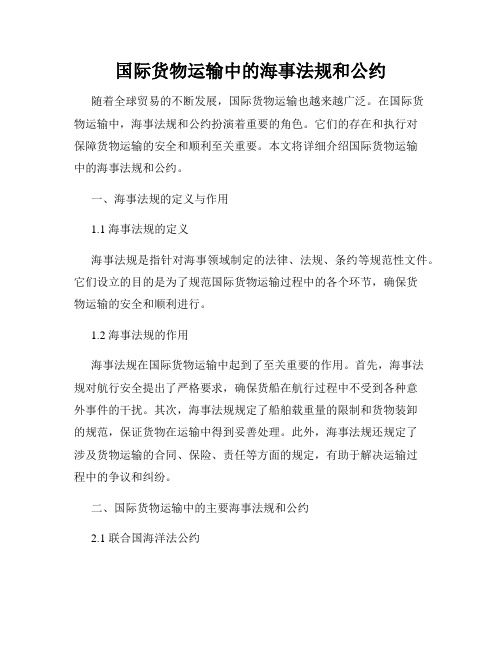
国际货物运输中的海事法规和公约随着全球贸易的不断发展,国际货物运输也越来越广泛。
在国际货物运输中,海事法规和公约扮演着重要的角色。
它们的存在和执行对保障货物运输的安全和顺利至关重要。
本文将详细介绍国际货物运输中的海事法规和公约。
一、海事法规的定义与作用1.1 海事法规的定义海事法规是指针对海事领域制定的法律、法规、条约等规范性文件。
它们设立的目的是为了规范国际货物运输过程中的各个环节,确保货物运输的安全和顺利进行。
1.2 海事法规的作用海事法规在国际货物运输中起到了至关重要的作用。
首先,海事法规对航行安全提出了严格要求,确保货船在航行过程中不受到各种意外事件的干扰。
其次,海事法规规定了船舶载重量的限制和货物装卸的规范,保证货物在运输中得到妥善处理。
此外,海事法规还规定了涉及货物运输的合同、保险、责任等方面的规定,有助于解决运输过程中的争议和纠纷。
二、国际货物运输中的主要海事法规和公约2.1 联合国海洋法公约联合国海洋法公约是国际上规范海洋事务的基本法律文件。
它规定了国际货物运输中的海上安全、海洋环境保护、船舶责任等方面的原则和规定。
该公约的制定对保障国际货物运输的安全和稳定至关重要。
2.2 国际海上避碰规则国际海上避碰规则是为了避免船舶在海上相撞而制定的。
它规定了船舶在不同情况下的避碰规则,确保航行安全。
在国际货物运输中,海上避碰规则是非常重要的,能够减少事故的发生,保护货物和船舶的安全。
2.3 国际海上保险公约国际海上保险公约是对国际货物运输中的保险事宜进行规范的公约。
它规定了船舶和货物的保险责任、索赔程序和赔偿标准等方面的内容。
通过国际海上保险公约,可以为货物运输提供适当的保险保障,减少贸易风险。
2.4 港口国控制公约港口国控制公约是国际海事组织制定的对船舶进行检查和控制的公约。
它规定了港口国对船舶进行安全检查的权力和义务,以及对不符合要求的船舶采取的措施。
港口国控制公约能够确保进入港口的船舶符合安全和操作要求,保障货物运输的顺利进行。
- 1、下载文档前请自行甄别文档内容的完整性,平台不提供额外的编辑、内容补充、找答案等附加服务。
- 2、"仅部分预览"的文档,不可在线预览部分如存在完整性等问题,可反馈申请退款(可完整预览的文档不适用该条件!)。
- 3、如文档侵犯您的权益,请联系客服反馈,我们会尽快为您处理(人工客服工作时间:9:00-18:30)。
MARPOL73/78由1973年国际防止船舶造成污染公 约及其1978年议定书和6个附则组成,还包含依据第8 条和第10条分别制定的两个议定书。
附则Ⅰ——防止油类污染规则 附则Ⅱ——防止有毒液体物质污染规则 附则Ⅲ——防止包装类有害物质污染规则 附则Ⅳ——防止生活污水污染规则 附则Ⅴ——防止船舶垃圾污染规则 附则Ⅵ——防止船舶污染大气规则
培训和值班标准 分委会(STW)
危险品、固体货物和集装箱运输分 委会(DSC)
大会是该组织的最高决策机构,每两年举行一次会议,但在 必要时可以召开特别会议。
理事会由40个成员国组成,其中(a)类和(bBiblioteka 类分别为10 个,(c)类为20个。
国际海事公约简介
UNCLOS1982
《联合国海洋法公约》。内容涉及海洋法的各个主要方面,包括 内水和领海、毗连区、用于国际航行的海峡、群岛国、专属经济区、 大陆架、公海、岛屿制度、闭海或半闭海、内陆国出入海洋的权利 和过境自由、国际海底、海洋环境保护和安全、海洋科学研究、海 洋技术的发展和转让、争端的解决等各项法律制度。
如:《中华人民共和国海上交通安全法》
第三条 中华人民共和国港务监督机构,是对沿海水域的交通安 全实施统一监督管理的主管机关。
第四十四条 对违反本法的,主管机关可视情节,给予下列一种 或几种处罚:
一、警告;
二、扣留或吊销职务证书;
三、罚款。
简易程序
第三十三条 违法事实确凿并由法定依据,对公民处以50元以下、 对法人或其他组织处以1000元以下罚款或者警告的行政处罚的,可 以当场作出行政处罚决定。当事人应当依照本法第四十六条、第四 十七条、第四十八条的规定履行行政处罚决定。
听证程序
第四十二条 行政机关作出责令停产停业、吊销许可证或者执照、 较大数额罚款等行政处罚决定之前,应当告知当事人有要求举行听 证的权利;当事人要求听证的,行政机关应当组织听证。当事人不 承担行政机关组织听证的费用。
公约由正文和三个附则组成。
《1969年国际船舶吨位丈量公约》
公约内容上的特点是总吨位和净吨位分别计算所得,相互没有依 赖关系。
公约由正文22条与2个附则和2个附录组成。
国内法简介
常用法律:
《中华人民共和国行政处罚法》 《中华人民共和国行政许可法》 《中华人民共和国行政复议法》 《中华人民共和国海上交通安全法》 《中华人民共和国海洋环境保护法》
关的政府规定和管理方面,为各国政府提供合作机制; 并在与海上安全、航行效率和防止及控制船舶对海洋 造成污染有关的问题上,鼓励和便利各国普遍采用最 高可行的标准。”
国际海事组织的性质:
1、政府间的团体; 2、联合国的专业技术机构; 3、法律制定机构。
国际海事组织机构:
国际海事组织由大会、理事会和4各主要委员会组成,即海上安 全委员会、海上环境保护委员会、法律委员会、技术合作委员会。 此外还有一个便利委员会和主要技术委员会的一些分委会。
MARPOL公约
《国际防止船舶造成污染公约》。1954年通过了《1954年国际防 止海洋油污染公约》。1973年通过了《1973年国际防止船舶造成污 染公约》,这是有史以来第一部全面性的防止船舶污染的国际公约。 经1978年议定书修正的《1973年国际防止船舶造成污染公约》简称 为MARPOL73/78。
国际海事公约概论
国际海事组织简介
1948年2月9日,通过了成立“政府间海事协商组织”(IMCO) 的公约,1982年5月22日更名为“国际海事组织”(IMO)。
截止到2006年10月10日,该组织共有167个会员国和3个联系会员 (中国香港、中国澳门和法罗群岛)
宗旨:“在于从事国际贸易的各种航运技术事宜有
海上环境保护委员会
海上安全委员会
大会 理事会
便利委员会
散装液体和气体 分委会(BLG)
船旗国履约 分委会(FSI)
航行安全 分委会(NAV)
稳性、载重线和渔船 安全
分委会(SLF)
消防分委会(FP)
船舶设计和 设备分委会(DE)
法律委员会
技术合作委员会
1972年伦敦公约 协商会议
无线电通信与搜救 分委会(COMASAR)
SOLAS公约自1974年通过后,又经历了1978年议定书、1988年议 定书以及十几次修正案的修正。
各个版本的SOLAS公约都是有效的,并非新版的综合文本取代旧 版的综合文本。学习SOLAS公约是要根据船舶的建造日期“对号入 座”。
ISM规则
《国际船舶安全营运和防止污染管理规则》纳入SOLAS公约的第Ⅸ 章,而成为强制性规则。该规则提供了船舶安全管理、安全营运和 防止污染的最低国际标准。
SOLAS1974的主要目的是规定与安全相关的船舶构造、设备及操 作的最低标准,由船旗国负责确保悬挂其国旗的船舶达到这一要求;
还规定船舶须持有公约规定的证书,作为该船舶已达到公约标准的 证明。
SOLAS1974由13个条款和1个负责组成。附则是公约的主体,它包 括附则(8章)及一个附录。
1994年加入了第Ⅸ、Ⅹ、Ⅺ章,1997年加入了第Ⅻ章。 我国是SOLAS公约的缔约国。
《中华人民共和国行政处罚法》
1996年10月1日起实施。共八章,六十四条。 第一章 总则 第二章 行政处罚的种类和设定 第三章 行政处罚的实施机关 第四章 行政处罚的管辖和适用 第五章 行政处罚的决定 第六章 行政处罚的执行 第七章 法律责任 第八章 附则
第十七条 法律、法规授权的具有管理公共事务职能的组织可以 在法定授权范围内实施行政处罚。
SOLAS公约
《国际海上人命安全公约》。其制订与“泰坦尼克”号事故有着 密不可分的关系。1914年缔结了《1914年海上人命安全公约》,标 志着航运界有了第一个国际上接受的海上安全标准。先后经历了 1914、1929、1948、1960、1974等不同版本。现行有效的是1974年 SOLAS公约。
STCW公约
1978年国际海事组织制定并通过了《1978年海员培训、发证和值 班标准国际公约》 (STCW1978)。1995年修正案对公约的修正发生 了根本性突破,充实了原有内容,增加了约束性条款。
《1966年国际载重线公约》
凡是无限航区的船舶,除其强度、稳性和抗沉性(指客船)应符 合各有关船级社规范和规则外,其夏季最小干舷(即夏季载重线) 应满足《1966年国际载重线公约》的要求。
